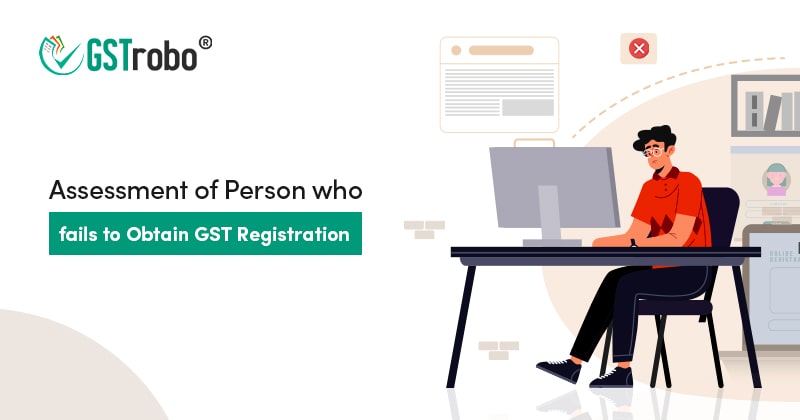Assessment of Person who fails to Obtain GST Registration
As per Section 63 of CGST Act, notwithstanding anything to the contrary in sections 73 or 74, where a taxable person fails to obtain registration despite being obligated to do so, or whose registration has been canceled under section 29 (2) but who was liable to pay tax, the proper officer may proceed to assess the tax liability of such taxable person to the best of his judgment for the relevant tax periods and issue an assessment order within five years from the date specified under section 44 for furnishing of the annual return for the financial year to which the tax not paid relates.

Provided, however, that no such assessment order shall be issued until the person is given a chance to be heard.
Assessment of Taxable Persons under GST
Section 63 of the CGST Act, 2017 deals with the assessment of unregistered individuals or individuals whose registration has been canceled but who are still required to pay GST. This section is one of the triggers for making an evaluation based on best judgment.
Section 63 of the CGST Act, 2017, states that a proper official may proceed to assess the tax liability of a taxable person who did not seek registration under the GST Act, even if he was responsible for it.
This section supersedes Sections 73 and 74 of the CGST Act of 2017.
Assessment of a Person whose GST Registration is Cancelled
It should be noted that a person whose registration was revoked by the proper officer under section 29(2) of the CGST Act, 2017, but who was obligated to pay tax and whose registration was canceled for a variety of reasons as specified in section 29(2) of the CGST Act, 2017. As per Section 63 of the CGST Act, such a person would likewise be regarded as an unregistered person.
The Proper Officer shall provide a notice to a taxable person in FORM GST ASMT-14 detailing the grounds for the proposed assessment on the best judgment basis.
Assessment of Unregistered Taxable Person
In the case of unregistered taxable persons, the Proper Officer shall issue the assessment order in FORM GST ASMT-15 within 5 years after the date provided in Section 44 for filing the annual return for the fiscal year to which the tax due pertains.
According to the proviso to Section 63 of the CGST Act, 2017, no such assessment order shall be made without first issuing a notice to show cause and providing the individual a fair chance to be heard. Thus, the order may be imposed only when the principles of natural justice have been followed.
The flow of Events and Orders under Section 63 of CGST Act, 2017 (Infographics)
| Sequence | Event | Time |
| 1 | Proper officer to issue notice to a taxable person | On noticing the defaulter |
| 2 | Summary of notice electronically uploaded | At the time of issuance of notice |
| 3 | Reply by taxpayer/opportunity of being heard | Within 15 days of notice |
| 4 | Assessment order | Within 5 years from the due date of the relevant annual return |
| 5 | Summary of the order electronically uploaded | At the time of issuance of the assessment order |
Time Limit to Pass an Assessment Order under GST
The time limit to pass an order of assessment is five years from the due date of submitting the annual return for the year to which the tax is not paid shall be considered.
For example, the assessment under Section 63 of the CGST Act, 2017 for the fiscal year 2018-19 can be made up to December 31, 2025, since the deadline for filing the 2018-19 annual report is December 31, 2020.
Assessment Forms
According to Rule 100 of the CGST Rules, 2017, sub-rule (2), the following forms are issued by the proper officer:
| Form No. | Purpose |
| GST ASMT – 14 | Notice to the taxable person |
| GST DRC – 01 | Summary of notice to be uploaded electronically |
| GST ASMT – 15 | Assessment order |
| GST DRC – 07 | Summary of order to be uploaded electronically |

One Reply to “Assessment of Person who fails to Obtain GST Registration”
Good information